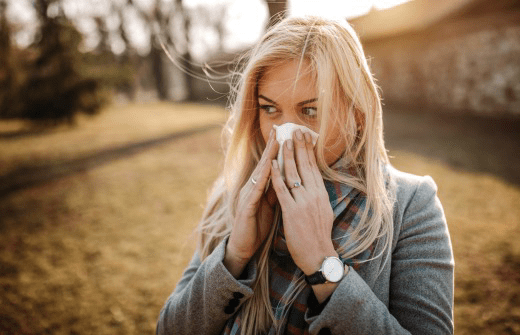Each of us responds to infection differently. Why do some people never get sick while others battle allergies, seasonal flu, or digestive problems? This is because we are unique and the immunity of each of us is different. This article will explore what the warning signals of a weakened immune system look like and what we can do to optimize its function.
Article At a Glanc:
- What is our Immunity Made Of?
- How to Build a Strong Immunity?
- Factors that Lower the Immune System Include:
- Symptoms of a Weak Immune System May Include:
- Ways to Strengthen Immunity Include:
The immune system needs to be continuously modulated, not only after we feel weak or become ill. These are mostly the first warning signals from our body that something is wrong.
It is important to realize that it is not just about boosting immunity because it may not work often and may even worsen any disease. Building up the immune system involves a set of measures that bring our immune defenses back into balance.
What is our Immunity Made Of?
The immune system serves as a shield, protecting against invading microorganisms, especially bacteria, viruses, or fungi. It is composed of various components that support each other, forming a vast network. It functions as a supervising police force, army, and cleaning service all in one.
We are all born with innate immunity, the oldest form of defense that provides almost immediate protection after bacteria or viruses enter the body. Any foreign substance is detected and destroyed within a few hours. Components of innate immunity include phagocytes (which digest germs), opsonins (cells that mark germs as targets to be killed), and other cells that can directly eliminate them (such as natural killer cells). Mechanical and chemical protection offered by the skin and mucous membranes is also important. Innate immunity does not distinguish between pathogens, and its responses are not specific to them.
Meanwhile, adaptive immunity, also known as acquired immunity, has a longer-lasting response, taking about 3 to 5 days, but is highly specific to particular pathogens. Adaptive immunity is not present at birth but is acquired during life. Its cells have the ability to remember microorganisms, and when exposed to them in the future, the responses are tailored to maximally eliminate specific pathogens or pathogen-infected cells.
The main actors in adaptive immunity are B-lymphocytes, which produce antibodies known as immunoglobulins (Ig), and T-lymphocytes, which support B-cells in antibody production and also respond by producing inflammatory substances called cytokines.
Factors such as the method of birth, duration of breastfeeding, and the environment in which we are raised from an early age also play important roles in building immune defenses.
Excessive hygiene at home is not always conducive to building strong immunity. While many factors during this period may be beyond our control, it is possible to strengthen the immune system and enhance the body's resistance by following a healthy lifestyle.
How to Build a Strong Immunity?
Any disease results from imbalances within the body, caused by various factors such as the environment we live in, lifestyle choices, food quality, physical activity, and our body's response to stress. Maintaining a healthy and robust defense system over the long term entails keeping our body functions in balance, or in other words, maintaining a balance between factors that strengthen and weaken the immune system. While some factors, like environmental pollution, may be beyond our control, it's crucial to focus on aspects we can influence and to eliminate elements that could burden the body and disrupt our internal environment.
Therefore, the more we are exposed to negative factors that weaken the immune system, the more crucial it becomes to prioritize prevention. For instance, individuals living in polluted cities with hectic daily schedules should prioritize a nutrient-rich diet, quality dietary supplements, weekend getaways to nature, and, above all, ensuring adequate and quality sleep.

Factors that Lower the Immune System Include:
- Lack of nutrients
- Poor quality food - This includes high-carb foods, simple sugars, highly processed foods, and foods with artificial flavorings
- Overuse of antibiotics and medicines in general
- Obesity
- Lack of physical activity
- Deteriorated environment
- Smoking
- Excessive cleaning at home
- Long-term elevated cortisol levels - This is associated with chronic stress
Symptoms of a Weak Immune System May Include:
- Frequent colds
- Irritability
- Poorly healing wounds
- Indigestion and stomach pain
- Skin rash
These symptoms could be the body's first signals that immune functions are imbalanced. However, making several lifestyle and dietary changes can help strengthen your immune system.
Ways to Strengthen Immunity Include:
- Healthy gut - Approximately 80% of the immune system resides in the gut, making gut health crucial. The intestinal epithelium serves as a semi-permeable barrier, regulating the passage of substances between the external and internal environments. Initially, it facilitates the absorption of vital nutrients while also providing a barrier against pathogenic molecules and bacteria. However, consumption of unhealthy, ultra-processed foods and chronic stress can trigger inflammation, compromising the integrity of the intestinal wall. This compromised barrier may then permit harmful molecules to enter the body..
- Regular movement and exercise - Exercise can help reduce stress hormone levels and chronic inflammation in the body. Some research suggests it also positively affects the production of antibodies and white blood cells.
- Melatonin -This hormone regulates our sleep-wake cycle and supports immune function. Its production is influenced by light, so quality sleep is achieved in darkness, without exposure to blue light. Melatonin levels peak between 10 pm and 6 am.
- Dietary supplements - Nutrients obtained from food and supplements are crucial for immune support. Deficiencies in vitamins, minerals, and trace elements can alter the body's immune response. Key nutrients for immunity include copper and zinc (part of the antioxidant superoxide dismutase), iron, selenium, magnesium, vitamin B6, vitamin B12, vitamin C (supports skin and mucous membrane integrity, collagen production, and iron absorption, and acts as a powerful antioxidant), vitamin E (an antioxidant), vitamin D (important for growth and cell formation), vitamin A.





















